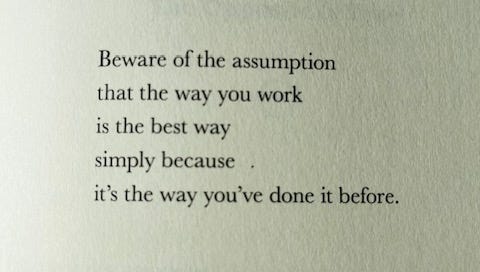Heads up, earbuds out, eyes wide open.
Rick Rubin's mind-altering, clarifying guide to a beautiful creative life.
I’m a habitual book highlighter.
With each bound tome in hand, there’s a blue PaperMate pen or yellow Hi-Liter within reach to mark the memorable, the teachable, the humorous and the timeless.
A dogear marks the page; an ink blot pinpoints the passage.
I prefer to read a handful of books at one time to cater to my mood, my energy, the setting, the time of day, even the weather. They all get marked somewhere at some point, lest they end up in the dusty pile to be recycled.
There’s one book I’ve been marking perpetually. Even obsessively.
(14 dog ears (!) in the first 100 pages)
Because it’s the rare mind-bending book that’s altering the way I think about … living.
I’m not even finished with it, but the first 123 (of 404) pages have been so rich I felt the need to place fingers to keyboard now.
“The Creative Act: A Way of Being,” isn’t the book many assumed American music producer Rick Rubin would write. The publishing house likely would have preferred he dish on his kaleidiscopic career that spans work with artists as varied and divergent as LL Cool J to Adele.
Instead, Rubin produced a much more meaningful and enduring body of work that holds exponentially greater utility than tales of industry gossip.
He’s essentially challenging the way we create through forcing us to rethink how we live.
Rubin begins by declaring in his opening chapter that “Everyone Is A Creator” even if you don’t see yourself as such.
You don’t need to be a singer, sculptor, writer or recording artist to “create.”
“Your entire life is a form of self-expression. You exist as a creative being in a creative universe. A singular work of art.”
Too Zen for you?
I too had initial doubts, but as the pages turned more expeditiously than during my usual readings, Rubin slowly became my Buddha for his eye-opening simplicity and clarity.
Much of what Rubin conveys seems so simple on its face: Tuning in, being aware, looking inward but also appreciating what’s right in front of us. Living in the moment, but with intention.
Listening, listening, listening.
Overcoming self-doubt by embracing risk and making it up as you go along. Welcoming the chance that the opposite of your preconceived notion is true.
Breaking a rule because they “direct us to average behaviors.”
“The goal is not to fit in. If anything, it’s to amplify the differences, what doesn’t fit, the special characteristics unique to how you see the world.”
Even if you find his high-minded meditative state hokey, Rubin provides practical kernels of advice for situations we all encounter.
Let’s take a universal one: Stuck in a creative rut?
Break through with awareness
Open your aperture for awareness, says Rubin.
Again, this seems simple. But in our hyper-connected/head-stuck in screen/ earbuds-turned-up-and-in world, most of us are missing it.
“When looking for a solution to a creative problem, pay close attention to what’s happening around you. Look for clues pointing to new methods … A writer may be in a coffee shop, working on a scene and unsure what a character is going to say next. A phrase might be overheard in the chatter from another table that provides a direct answer, or at least a glimpse of a possible direction.”
“A helpful exercise might be opening a book to a random page and reading the first line your eyes find. See how what’s written there somehow applies to your situation. Any relevance it bears might be by chance, but you allow for the possibility that chance is not all that’s at play.”
A connective theme that Rubin harps on throughout is awareness — and how we’re desperately lacking it. He says we need to practice it constantly in order to live a life that’s a “state of constant openness to receiving.”
This is obviously difficult.
We’re at brunch with friends we see regularly. We passively tune in to conversations while checking our phone, refreshing Twitter or eyeing someone attractive on Instagram. We’re hungry so we’re more focused on food than engagement.
You have a child; he is screaming in the background.
You just finished an unsettling conversation with your boss about your future. That interaction lingers.
Everything in life is meant to sap us of awareness, and that, in turn, can diminish creativity.
I noticed an instance of glaring lack of awareness at a recent brunch with a trio of friends.




